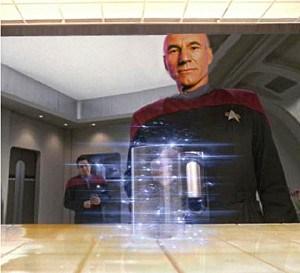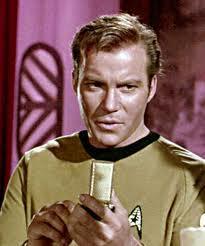
“The economics of the future is somewhat different. You see, money doesn’t exist in the 24th century… The acquisition of wealth is no longer the driving force in our lives. We work to better ourselves and the rest of Humanity.” Jean Luc Picard
A world without money and paid work is, of course, pure science fiction, socialist-seeming, nonsense. Except that future is already here, at least partially. We know because we’re already living a variation of that future along with a growing rank of others.
But before we get to that, a little introduction is in order.
Last year we spent this day giving thanks for how much better the present is than the past (seriously, the “good old days” actually blew). Today we’re spending Thanksgiving thinking about how much better the world is becoming than it already is.
And if we were inspired to write last year’s Thanksgiving Day retrospective by thoughts of superhero superpowers it seems fitting that Star Trek inspire today’s forward-looking post.
As travelers we’ve long envied Picard and Kirk for their transporters. The ability to pop anywhere in an instant is the holy grail of anyone who has ever squeezed into a coach class seat. But it occurs to me that teleportation is far more than that. The technology doesn’t just change how we’d get from place to place (no more L.A. traffic, yay!), it changes everything. In fact, it makes the economy described in Picard’s quote not only possible, but seemingly inevitable.
How? By ending scarcity.
Money becomes pointless after a point
Without going too deeply into the nerdy weeds or sticking strictly to the Star Trek canon, the teleporter is basically a technology for replicating physical things. It converts stuff to energy and then reassembles it someplace else. But once you have that ability there’s no reason you’d need to return things back to their original form. If you can transform a rock into energy and back into a rock and if you can do the same thing with an iPhone you can certainly turn your rock into an iPhone; or a turkey dinner; or anything else of basically equivalent mass. It is 24th century alchemy where one can transmogrify anything into anything else.

Replicating a spot of tea – Earl Grey, Hot.
With that technology widely available (and it would be widely available because, one assumes, there’s nothing to prevent replicating replicators) Picard’s statement makes perfect sense. No one works for money in the 24th century because money is pointless. Once everyone can turn a lump of sand, or an old chair, into diamonds or whatever else they want money loses all value (so too do diamonds, by the way.) There is no longer any reason to work for cash because everything can be had without it.
Instead of striving for money and possessions, you would find other sources of motivation. Perhaps you’d be drawn to the prestige of being a Starship Captain or the acclaim of discovering new scientific advances. Maybe you have more modest ambitions and you’d spend your time gallivanting around the universe sharing your experiences on a travel blog. Whatever your personal calling, it would have nothing to do with making money or acquiring things. As Picard says, you’d work at bettering yourself and humanity.
They have more but we have more than enough
Now turn, for a moment, from Picard’s world of absolute overabundance to the real world of mere abundance. Today the world easily produces more than enough food to feed its population. We easily manufacture enough clothing and shelter, too. We’re terrible at distributing those things, but we produce more than enough.
When measured against our true needs for shelter, clothing and food, most of us in the developed world enjoy a pretty significant surplus. We live in houses larger than necessary, spend more on fashion than is required, and consume far more food than is even healthy for us.
Unlike Picard, we can’t have everything we want. But we certainly have more than we need.

Vintage 1960′s cell phone.
Beyond some base level of comfort, we chase, consume and work for things not because we have to. We do it because we want to. There’s nothing wrong with that. But it’s important to recognize that it is a choice. We don’t need to work more hours to afford an extra 1,000 square feet of living space any more than someone needs to work in the future Star Trek envisions. They work entirely because they want to while most of us work more than we need to. The difference between us and them doesn’t seem so great after all.
And those differences are narrowing every day. It used to be that “good jobs” required us to work a specific number of hours each day on specific days each week. But technology is increasingly upending that old relationship as well. A growing amount of work is now done remotely on a consulting basis.
The 40+ hour work week is becoming an archaic tradition
Now, instead of getting paid to show up at an office for a set number of hours, people are being paid to deliver a specific project. How many hours you work isn’t predetermined. You work as long as it takes to get the job done. No more. No less. That arrangement creates never-before-possible opportunities for managing your “work/life balance.”
If you do your best work at three in the morning on Sundays, you can do that. If you prefer cities or rural mountain tops far from civilization, go work there. If you need or want more money, take on more projects. If you’d prefer more free time to spend pursuing uncompensated interests, take on fewer projects.
The dynamic here is that in our emerging freelance economy we have the freedom to tailor both our income and our expenses to achieve whatever balance we desire. We can choose to consume more and sell more of our hours each day to pay for that consumption. Or we can choose to work and consume less and live a life closer to the one described by Captain Picard in the opening quote. The choice is yours.
The wonderful thing about good science fiction is that it lets us imagine a plausible future that we can either aspire to or take caution from. To its great credit Star Trek charted an inspirational course with astounding vision. It aired the first-ever televised interracial kiss just six months after the assassination of Martin Luther King Jr. and predicted Siri before Steve Jobs entered high school.
Today it is helping us imagine a future economy where paid work is a thing of the past, or at least one where it is increasingly optional. With a little vision of our own it’s not too difficult to see that economy already taking shape. All we need now is the will and the imagination to capture that future for ourselves.
————————-
Related articles discussing how to build that 24th century lifestyle today:
A world without work
How to create a mobile freelance business
How to revolutionize your financial life

